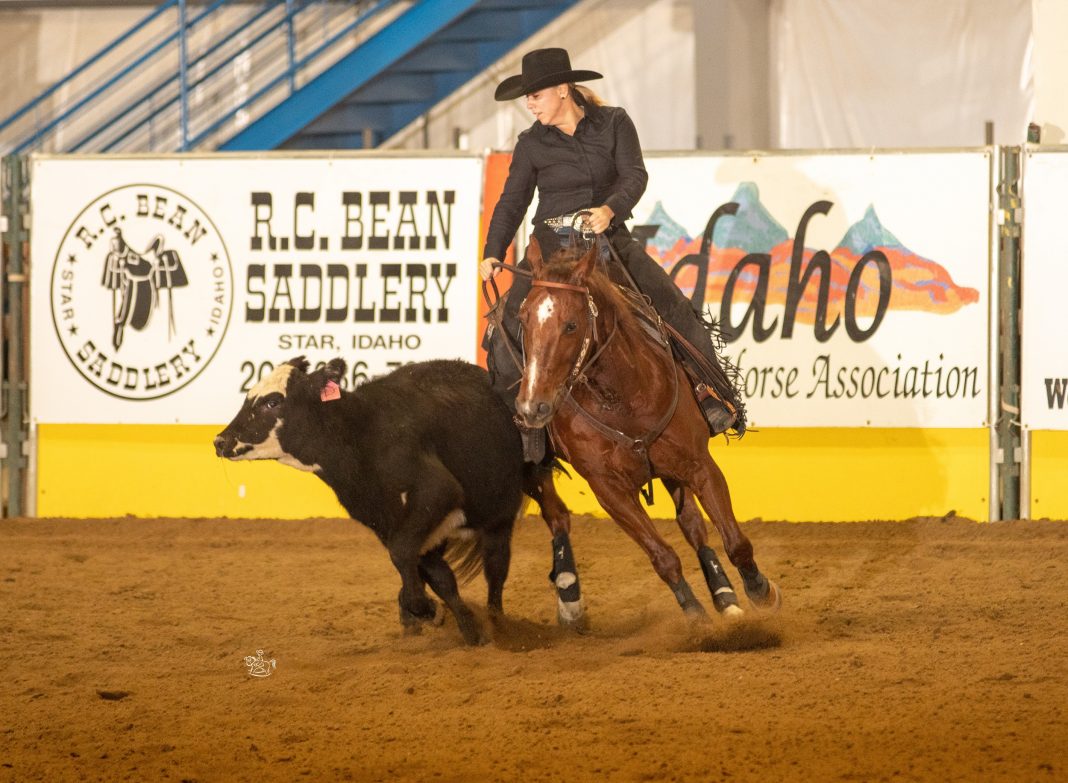If you know Carrie Whisler, you know she rides. “I don’t hold back who I am, I talk about it,” she says. “It’s a part of me that you can’t cut out, so a lot of people know about it. I just got done at Rotary and people were asking me how my show season went.”
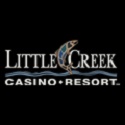 Since her mother, Jennifer Whisler, bred, raised, and showed Quarter Horses, Carrie literally grew up riding. She was in a saddle before she could walk. And she took to it like water. “I was the kid that grew up going to my mom’s horse shows and I would try to ride everyone’s horse,” Carrie shares. “I remember asking people ‘will you let me ride your horse? I will bring you your brushes, I will hand out flowers at the Daffodil Classic, I will help here, I will help here.’ I was always trying to get on a horse. And I still am. Even at my trainers, I’ll ride any horse he will let me ride.”
Since her mother, Jennifer Whisler, bred, raised, and showed Quarter Horses, Carrie literally grew up riding. She was in a saddle before she could walk. And she took to it like water. “I was the kid that grew up going to my mom’s horse shows and I would try to ride everyone’s horse,” Carrie shares. “I remember asking people ‘will you let me ride your horse? I will bring you your brushes, I will hand out flowers at the Daffodil Classic, I will help here, I will help here.’ I was always trying to get on a horse. And I still am. Even at my trainers, I’ll ride any horse he will let me ride.”
Like most horse-crazy kids, Carrie did 4-H and performance shows growing up, and was a member of the South Bay 4-H Club and the Flying Hooves 4-H Club. Meanwhile, her mom transitioned from Quarter horses to Paint horses, and competed in cutting. Cutting is a sport that evolved from necessary work that was done on ranges, namely, cutting a cow out of a herd and then keeping it from returning so it could be caught for branding, doctoring, etc. In the sport, horse and rider work as a team to cut a cow (usually steers or heifers) out of the herd. It is in then really up to the cow-savvy horse to keep it from returning. Judges score on a scale.
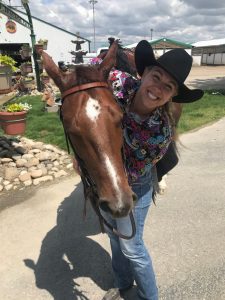
Carrie took a break from riding during college, and she noticed a physiological change. “I couldn’t figure out why the darkness in winter was affecting me so much,” she shares. “And then I realized for my whole life I have always ridden all year round and I would be under those bright arena lights and barn lights so much, I think the darkness didn’t affect me as much.”
So as soon as she could, Carrie was headed back to her family’s 60-acre ranch, Maytown Ranch, here in Thurston County. In her late 20s, Carrie’s mom had a cutting horse that also had reining training and was available for Carrie to ride. It was then that Carrie sold her last performance horse and made the transition to reined cow horse.
Reined cow horse, also called working cow horse, is a competition where horse and rider compete in three different events, all of which use the skills that would be needed on a real-life ranch. The competition includes herd work (similar to cutting), reining (a pattern class that shows the horse’s athleticism), and cow work (a class with just one cow where horse and rider have to maneuver it in a set pattern).
“It’s fun because I get to ride and train with my mom and help her,” Carries says. But they don’t normally compete together, since her mom is doing cutting while Carrie does reined cow horse. “She also still does some breeding, in fact the horse I am competing on now is a home-grown horse and that is really cool,” she adds. “And my mom rides a home-grown half-sister of my horse, that is also doing really well. I just had a major win, she just had a major win, and we were both in the Quarter Horse Journal, so that was really cool.” Carrie’s current horse is named Maytown Moonshine, with Brando being his barn name.
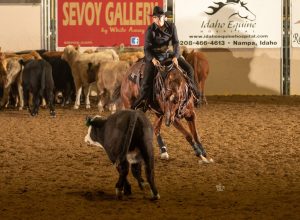
What Horses Taught Her
“I love the competition, but it’s not just the competition, it’s that high level of being able to connect and communicate with another being and to overcome challenges that I never thought I would be able to,” Carrie says.
She learned from years of working around horses that you can’t tell them, you show them. “When we are running down a rail after a cow at 20 miles per hour, I can’t tap my horse on the shoulder and say, ‘hey I really need you to turn at that marker,’ and I can’t tell the cow that either. You have to have a huge amount of trust between you and your horse. And when you have that, the horse will give you everything. And to have that, that is so cool and rewarding.”
And she also learned about hard work, not blaming others, and goal setting. “My trainer will be the first to say, ‘It’s not the horse’s fault.’ You really learn to take responsibility for your actions, and problem solve if something is going wrong. And you learn about goal setting.”
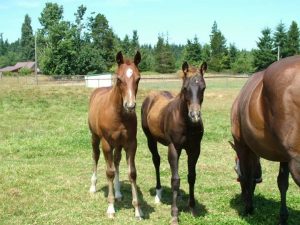
Right now, it’s Carrie’s off-season for showing, but that doesn’t mean she isn’t planning ahead. “I’m thinking about next March,” she says. “It’s the first national show, so how are we going to get there? Brando will get some time off and then we are going to work towards it with a step-by-step plan. And sometimes, that means moving backward to move forward.”
Using Horse Sense Outside the Arena
It should be no surprise at this point that Carrie talks about her horses in all aspects of her life, including her job as vice president, commercial relationships at Olympia Federal Savings. “I use a lot of analogies when I talk to business owners about goal setting or how they are going to get to this point. Instead of just stating a goal such as, ‘I want to get to Worlds,’ you have to say how you will get there. It’s the same with the business owners.”
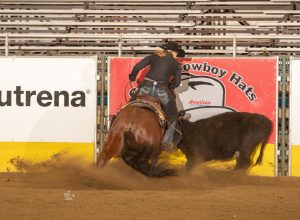
Carrie notes that riding has given her a lot of confidence as well as thinking outside the box and problem solving, which she believes makes her successful at her career as well. “When things are not going right with a horse, you have to stop and figure it out based on what you are doing,” she explains. “How you are communicating, and what do you need to do to change the outcome, it’s being more introspective, and that’s important in business as well.”
Above all, when that horse throws you, you get back on, and that’s the same thing in life. Carrie is ready to ride any horse or face any challenge, both in and out of the arena.









































